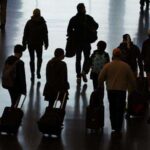A two-day meeting of the Caribbean Community’s ‘Free Movement Officials” is scheduled to begin today (Wednesday, December 11) amid spreading disillusionment over the continuing failures by member governments to make this a reality for too many citizens who remain exposed to hostile treatment, and worse, at regional ports of entry.
Within recent years, and more lately, Trinidad and Tobago, Jamaica, Barbados and The Bahamas in particular, have often been in the news with negative reports involving treatment of CARICOM citizens either denied entry or deported as illegal immigrants
But following last month’s denial of entry and subsequent expulsion from Trinidad and Tobago of 13 Jamaican nationals, a virtual storm of protest erupted within Jamaica with some passionate calls for a trade boycott of that country’s export of commodities and trade in service.
Conscious of the volume and worth of their bilateral trade and investment relations as the Community’s two most developed manufacturing-based economies and capacities for delivery of services, a hurriedly-arranged two-day meeting was held in Kingston at Foreign Ministers level, initiated by Mr Winston Dookeran’s Jamaica counterpart, Mr Arnold Nicholson.
While awaiting the outcome of the latest meeting of the Community’s ‘free movement officials” following conclusion of their work agenda tomorrow, it seems appropriate and timely for the public to learn of relevant aspects of the “agreement” reached between the Foreign Ministers of T&T and Jamaica during their December 2-3 meeting in Kingston.
Despite doubts among critics, that meeting could well prove a pace-setting event according to the “agreed minutes”, depending on the will to implement.
The Foreign Ministers and their advisers first focused on an overview of “hassle-free movement for Jamaicans into Trinidad and Tobago and, related, implications of the recent historic ruling by the Port-of-Spain-based Caribbean Court of Justice (CCJ) on the rights of citizens to free intra-regional movement resulting from the case involving the Barbados Government and Jamaican national, Shanique Myrie.
Two conditions
In this context, they discussed the ‘Community Law’ as clarified by the CCJ’s ruling in the Shanique Myrie case as well as well as the entitlement of Caricom nationals to a six-month entry stamp —“unless one of two conditions ARE not fulfilled, namely, the passenger is ‘undesirable’, or will pose a charge on the public purse, and that these conditions must be interpreted strictly or narrowly…”
The minutes also reflect consideration given to the CCJ’s ruling on the “appeals process” against procedures enforced by immigration authorities to deny entry into any member state—all of which are signatories to the revised CARICOM treaty governing the operations of the single market and economy.
While in T&T the Minister of National Security, Senator Gary Griffith, has publicly rebuked his Foreign Minister colleague, Dookeran, for failing to engage in prior consultation with him before the “agreement” reached with Jamaica’s Nicholson, the reality is that unless either side fail to implement the spirit and letter of the “Kingston Accord”, then CARICOM could well be faced with even wider and deeper challenges to make a reality of its commitment to “One Market for One People”.
The minutes of the Dookeran/Nicholson meeting point to changes that must be pursued in relation to free movement of CARICOM citizens. For instance, it was agreed that “legislative changes” may have to be introduced, including, “in the interim, new directives to be given to Immigration Authorities to take account of Community Law with a view to application administratively…”
Complaints procedures
Further, according to the minutes obtained by this correspondent, the Foreign Ministers and their respective high-level advisers discussed the “complaints procedures” adopted at last month’s five-day meeting in Guyana of the Council for Trade and Economic Development (COTED) in relation to CARICOM nationals seeking to exercise the right of entry into a member state.
They agreed to “disseminate information on the procedure through the appropriate channels and to make the complaints form available at points of entry.
The COTED meeting had also decided that in the event of a denial of the right of entry, the involved “CARICOM national should, in accordance with Article 36.1 of the Vienna Convention on Consular Relations, be advised of the right to consular representation and that access to such representation should be facilitated by the receiving state..”
In Kingston, the Nicholson/Dookeran meeting agreed on the need for ”appropriate facilities” to accommodate travelling passengers who are detained at points of entry pending return to their homeland, and that the relevant airlines “be exhorted to ensure that suitable provisions are made”.
In what could well provide the basis for wider guidance by the Community as a whole, it is felt that the ‘agreed minutes” should be shared with all governments of the 15-member Community, even as T&T seeks to overcome current ‘political hiccups’ resulting from surprising negative comments by National Security Minister Griffith.
Just yesterday (Tues) in its editorial, the Daily Nation, noted that Prime Minister Kamla Persad-Bissessar, “would have difficulties ignoring in particular derogatory remarks by Mr Griffith that CARICOM citizens were treating Trinidad and Tobago as ‘a shopping mall’ in their exploitation of the Community’s provisions governing intra-regional freedom of movement….”
Therefore, the editorial added, “we await developments on this issue on the Prime Minister’s return from South Africa…”
Prime Minister Persad-Bissessar is expected to be back home today to preside at her next regular cabinet meeting tomorrow (Thursday, December 12)










